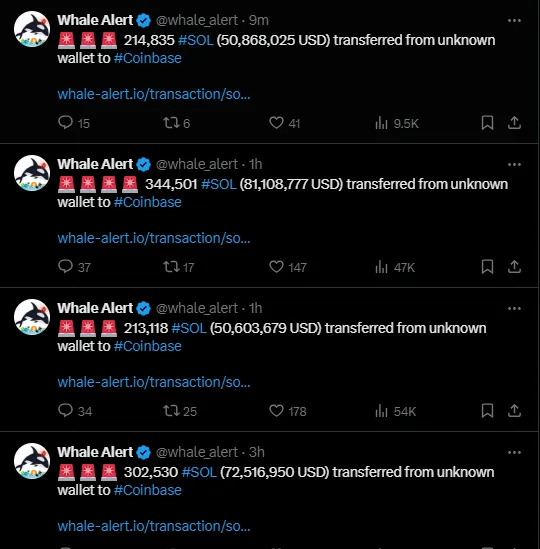Users Slam Coinbase Over Delayed Solana Transactions, Call for Proof of Reserves
- Coinbase faces backlash for Solana (SOL) transaction delays, with users reporting waits exceeding nine hours, raising liquidity concerns.
- Allegations emerge that Coinbase may be staking users' SOL without consent, causing delays tied to unstaking processes.
- Calls for transparency grow as Whale Alert flags large SOL transactions to Coinbase, fueling demands for immediate Proof of Reserves.
Coinbase, the largest US-based crypto exchange, is being criticized by users for significant delays in processing Solana (SOL) transactions.
Users have reported waiting over 14 hours to send or receive SOL, sparking concerns about the exchange’s liquidity and operational practices.
Concerns Grow Over Coinbase Liquidity Issues and Staking Practices
Coinbase users have expressed widespread frustration over delayed transactions. One investigative journalist reported the cancelation of their transaction after a full day of pending status. Another user shared that they had two transactions stuck for over 14 hours.
A growing narrative suggests that Coinbase might be staking customers’ SOL without their consent to earn yield. Some speculate that the delays may stem from the unstaking process, potentially needed to replenish operating reserves before executing transactions.
“Deposit SOL to Coinbase, they take your SOL and stake it to earn yield off your deposits, and oops — if everyone wants SOL all at once, they don’t have your liquidity,” one user summarized.
This incident comes amid heightened industry skepticism following the collapse of FTX. The entire saga exposed significant mismanagement and a lack of transparency in centralized exchanges (CEXs), with critics arguing that the latest pattern is reminiscent of that incident.
CryptoCurb, a popular user on X, questioned Coinbase’s solvency and called for immediate Proof of Reserve (PoR) audits. He also criticized the industry for seemingly abandoning PoR audits, a key reform measure introduced after the FTX debacle.
“It is looking VERY likely that Coinbase was caught staking their customers SOL without customers consent. This is NOT okay if confirmed,” the user wrote.
Fueling the suspicion further, blockchain-tracking platform Whale Alert flagged multiple large SOL transactions from unknown wallets to Coinbase exchange.

Amid the ongoing SOL transaction delays and large transfers, users urge Coinbase to provide clear evidence of its liquidity and operational integrity. Coinbase Support responded to user complaints, attributing the delays to “technical and blockchain issues.”
However, Mert Helius, a prominent developer, ascribed the delays to Coinbase’s internal infrastructure, which struggles to handle Solana’s rapid transaction speeds.
“This has nothing to do with the chain [Solana]. My guess is they just can’t keep up with the tip of the chain because they generalize their indexing to all chains but don’t account for how different those chains are,” Helius clarified.
Another user, Sidehustle, pointed out that Coinbase’s largest Solana validator is set to unstake 567,000 SOL — worth approximately $130 million — at the end of the current epoch.
“Did they run out of liquid SOL and are now waiting until the epoch boundary to push through withdrawals?” he questioned.
This is not the first time Coinbase has faced scrutiny over its custody practices. Recently, BlackRock filed to amend its IBIT Bitcoin ETF amid user concerns over Coinbase’s custodial services. As BeInCrypto reported, investors called for Coinbase, as custodian, to provide on-chain proof of Bitcoin purchases for ETFs to ensure transparency.
“Subject to confirmation of the foregoing required minimum balance, Coinbase Custody shall process a withdrawal of Digital Assets from the Custodial Account to a public blockchain address within 12 hours of obtaining an Instruction from Client or Client’s Authorized Representatives,” an excerpt in the filing read.
Beyond this controversy, Coinbase has recently launched Bitcoin-backed loans for USDC, drawing mixed reactions from the crypto community.
免責聲明:投資有風險,本文並非投資建議,以上內容不應被視為任何金融產品的購買或出售要約、建議或邀請,作者或其他用戶的任何相關討論、評論或帖子也不應被視為此類內容。本文僅供一般參考,不考慮您的個人投資目標、財務狀況或需求。TTM對信息的準確性和完整性不承擔任何責任或保證,投資者應自行研究並在投資前尋求專業建議。
熱議股票
- 1
- 2
- 3
- 4
- 5
- 6
- 7
- 8
- 9
- 10